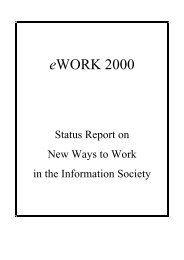Proceedings of 8th European Assembly on telework (Telework2001)
Proceedings of 8th European Assembly on telework (Telework2001)
Proceedings of 8th European Assembly on telework (Telework2001)
You also want an ePaper? Increase the reach of your titles
YUMPU automatically turns print PDFs into web optimized ePapers that Google loves.
38According to Kauppinen, the industrialised society has three great workers: 1) Henry Noll, hero<str<strong>on</strong>g>of</str<strong>on</strong>g> capitalism, 2) Alexei Stakhanov, hero <str<strong>on</strong>g>of</str<strong>on</strong>g> socialism and 3) Rosabeth Moss Kanter, hero <str<strong>on</strong>g>of</str<strong>on</strong>g> theknowledge society. As the knowledge society is gathering momentum, the image <str<strong>on</strong>g>of</str<strong>on</strong>g> the typicalworker will also undergo changes. The industrial worker will transform first to a transacti<strong>on</strong> citizenand finally to a knowledge citizen.The driving forces for the transiti<strong>on</strong> from industrial society towards knowledge society and theimpacts <str<strong>on</strong>g>of</str<strong>on</strong>g> change <strong>on</strong> the citizens come through living c<strong>on</strong>diti<strong>on</strong>s, working c<strong>on</strong>diti<strong>on</strong>s and industrialrelati<strong>on</strong>s. Knowledge society is not yet a clearly defined c<strong>on</strong>cept and Kauppinen put forward threehypotheses featuring it: 1) A knowledge company knows how to do. 2) The knowledge societyknows how to do. 3) The knowledge society works with knowledge by using data and informati<strong>on</strong>as raw material for producing new knowledge in order to know how to do. Kauppinen also listedsome characteristics <str<strong>on</strong>g>of</str<strong>on</strong>g> the knowledge society: 1) The knowledge society is sustained throughnetworks, not single organisati<strong>on</strong>s. 2) It supports distributed rather than centralised intelligence. 3)It requires multiple skills and c<strong>on</strong>tinuous learning. 4) It emphasises sustainability, not subsidizati<strong>on</strong>.5) It emphasises the value <str<strong>on</strong>g>of</str<strong>on</strong>g> every human mind. 6) It is enabled by interactive ICTs while it issimultaneously driving the development <str<strong>on</strong>g>of</str<strong>on</strong>g> new ICTs.Kauppinen defined foresight as a family <str<strong>on</strong>g>of</str<strong>on</strong>g> processes intended to capture the dynamics <str<strong>on</strong>g>of</str<strong>on</strong>g>transformati<strong>on</strong> by placing today’s reality within the c<strong>on</strong>text <str<strong>on</strong>g>of</str<strong>on</strong>g> tomorrow’s possibilities. It isinherently proactive, reflecting the belief that the future is influenced by today’s decisi<strong>on</strong>s andacti<strong>on</strong>s. It emphasises the human abilities <str<strong>on</strong>g>of</str<strong>on</strong>g> forethought, creativity and system thinking aboveand bey<strong>on</strong>d the usual analysis and judgement. The major foresight methodologies are: 1) bottomup/ social dialogue/group work, 2) survey technique/Delphi, 3) scenario technique with multiplemethods, 4) c<strong>on</strong>cept analysis and 5) top-down/state-driven/commissi<strong>on</strong>-driven approaches.The objective <str<strong>on</strong>g>of</str<strong>on</strong>g> the <str<strong>on</strong>g>European</str<strong>on</strong>g> Knowledge Society Foresight project (EKSF) is to produceforesights <strong>on</strong> the driving forces and impacts <str<strong>on</strong>g>of</str<strong>on</strong>g> the knowledge society in order to identifyand support paths to positive transformati<strong>on</strong> while avoiding paths leading to unsatisfactorydevelopment.The topic <str<strong>on</strong>g>of</str<strong>on</strong>g> Jouni Backman, Member <str<strong>on</strong>g>of</str<strong>on</strong>g> the Finnish Parliament, was the summary <str<strong>on</strong>g>of</str<strong>on</strong>g> the meeting<str<strong>on</strong>g>of</str<strong>on</strong>g> <str<strong>on</strong>g>European</str<strong>on</strong>g> parliamentarians (EPRI), which was held in Helsinki and Tallinn just before theTelework c<strong>on</strong>ference. Backman pointed out that up to now, the development <str<strong>on</strong>g>of</str<strong>on</strong>g> the informati<strong>on</strong>society has been based too much <strong>on</strong> technology, and he called it processor-led. According toBackman, it is necessary to change our ways <str<strong>on</strong>g>of</str<strong>on</strong>g> thinking to make it process-led. The old operatingmodels <str<strong>on</strong>g>of</str<strong>on</strong>g> the industrial society must be revised to resp<strong>on</strong>d to the new needs and opportunities.The change is already under way, primarily in the private sector. The hierarchic and bureaucraticapproach, which mainly works from the top down, is giving way to a networking model based<strong>on</strong> interacti<strong>on</strong>. The political decisi<strong>on</strong>-making and public administrati<strong>on</strong> still mainly operate <strong>on</strong> thebasis <str<strong>on</strong>g>of</str<strong>on</strong>g> the old models.Backman stressed that the informati<strong>on</strong> society should also be a genuine civil society. Newtechnology provides great opportunities to increase the quality and accountability <str<strong>on</strong>g>of</str<strong>on</strong>g> policies, aswell as freedom <str<strong>on</strong>g>of</str<strong>on</strong>g> speech and participati<strong>on</strong>. Nati<strong>on</strong>al parliaments play a key role in this work.Through legislati<strong>on</strong> and the use <str<strong>on</strong>g>of</str<strong>on</strong>g> budget funds, they should create the prec<strong>on</strong>diti<strong>on</strong>s for the equaldevelopment <str<strong>on</strong>g>of</str<strong>on</strong>g> the informati<strong>on</strong> society. At the same time, they should develop their own activitiesto a more open and modern directi<strong>on</strong>.








